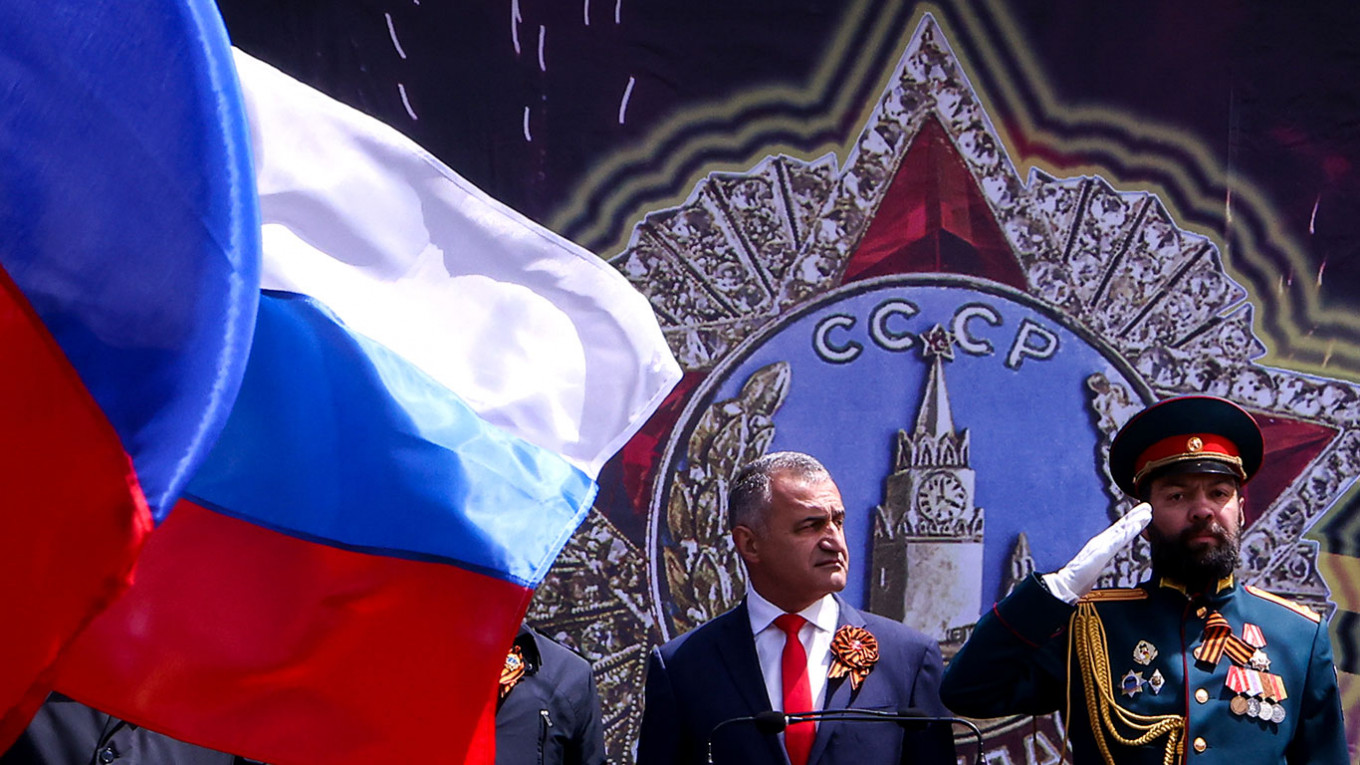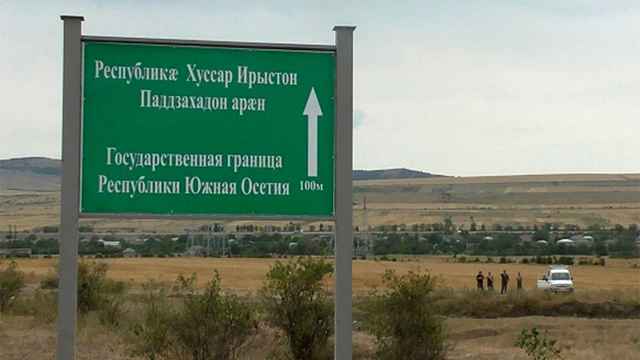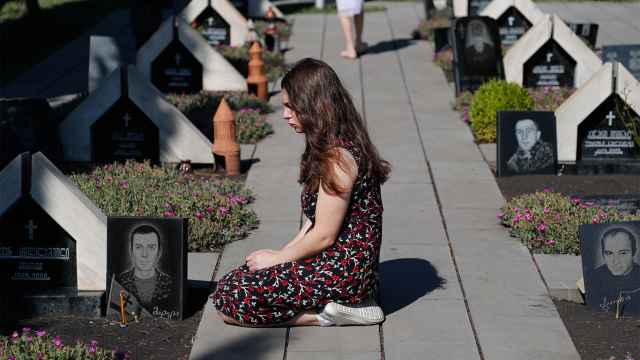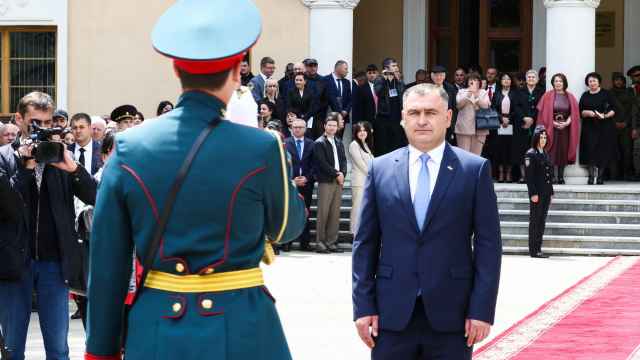The de factor leader of Georgia's breakaway region of South Ossetia has announced that the territory will hold a referendum on joining Russia on July 17. But can the vote actually go ahead and would the outcome change anything?
Holding the vote will be complicated by the fact that the South Ossetian leader, Anatoliy Bibilov, recently lost his bid for reelection and will no longer be president on that date. Meanwhile, neither his replacement nor Moscow have shown much enthusiasm in going ahead with the exercise.
Bibilov announced the vote late on May 13, first on his Telegram channel and then on his official website. The question on the referendum will be: “Do you support the unification of the Republic of South Ossetia and Russia?”
South Ossetia was in the centre of the Russian-Georgian war in 2008 after which the Kremlin recognised the territory – along with another separatist region, Abkhazia – as an independent state and stationed military bases there.
It is necessary to hold the referendum now because “today, the window of opportunity is open for us,” Bibilov said. “Russia is today in a very difficult situation … many so-called partners of Russia are turning away from Russia. We, the Republic of South Ossetia, have always considered ourselves part of the Russian people.”
It’s not clear, however, whether Bibilov is going to be able to go through with the vote, or whether this will be yet another failed attempt by the tiny territory to attach itself to Russia.
Following the surprise announcement, Bibilov’s newly elected successor, Alan Gagloev, reiterated the cautious stance he has maintained since Bibilov first announced the referendum during the election campaign: that in theory he is in favor of joining Russia, but that now may not be the right time.
“As a son of our motherland and the president of South Ossetia, elected by the people, I entirely support the idea of joining the divided Ossetian people as part of a united Russia,” Gagloev told the Russian state-run news agency TASS on May 14. (Neighboring North Ossetia, home to most Ossetians, is already a part of Russia.) “From my position, I want to assure the people of South Ossetia that my actions connected with the unification referendum will be directed at observing international legal norms and consultations and the implementation of agreements with the Russian Federation.”
Gagloev pointed out that a 2015 agreement on “union and integration” between Russia and South Ossetia called on the two sides to carry out a coordinated foreign policy and “inform one another on actions that affect bilateral cooperation” — implying, it seems, that Bibilov had not taken that step.
Gagloev further argued that Bibilov had neglected to coordinate the planning of the referendum with “the newly-elected president” (Gagloev here referred to himself in the third person), “knowing that the entire complex of activities around the referendum would have to be carried out by him [Gagloev] during a time of personnel changes.”
Gagloev will take over the de facto presidency on May 24.
The referendum also appears to have been approved by South Ossetia’s Central Election Commission and Supreme Court in an unusually quick period of time. While the constitution calls for the Supreme Court to approve the request within 14 days, in this case, it happened “in a matter of hours,” the U.S.-funded RFE/RL reported.
Whatever the intrigue within South Ossetia, the decision on whether or not South Ossetia joins Russia is going to be made in Moscow, as happened in the analogous annexation of Crimea in 2014.
And the signals from Moscow have not been strong. Senior Russian officials have yet to weigh in on the referendum, and Russian members of parliament have been giving mixed messages on the referendum.
One Russian MP, Artur Taymazov, who represents North Ossetia, said in an interview with TASS that “if there has already been a decision to conduct the referendum, then yes, I think we are heading toward a unification of South Ossetia with Russia.” He added: “Today, the most basic goal of every Ossetian is for our people to live together.”
But another MP, Konstantin Zatulin, poured cold water on the idea. “I respect Anatoliy Bibilov, but his actions now are not entirely correct,” he told the newspaper Vedomosti. “This referendum is not right for Russia now.”
South Ossetia’s official state news agency, Res, republished both articles.
Russia recognizes South Ossetia as an independent state, as do a handful of Russian allies. Most of the rest of the world, meanwhile, still considers the region as part of Georgia, even after it unilaterally broke away from the country during a war in the 1990s.
Tbilisi has condemned the plans to hold the referendum; it considers the authorities in South Ossetia illegitimate and the territory to be occupied by Russia, which heavily financially and militarily backs the self-proclaimed government there.
“It is unacceptable to discuss any referendums while Georgia’s territory is occupied by Russia,” Georgia’s Foreign Minister David Zalkaliani said on March 31. “No referendum will have any legal force amid the occupation, especially against the backdrop of hundreds of thousands of our citizens being expelled from their homes as a result of the ethnic cleansing and not being allowed to return.”
This article was originally published by Eurasianet.
A Message from The Moscow Times:
Dear readers,
We are facing unprecedented challenges. Russia's Prosecutor General's Office has designated The Moscow Times as an "undesirable" organization, criminalizing our work and putting our staff at risk of prosecution. This follows our earlier unjust labeling as a "foreign agent."
These actions are direct attempts to silence independent journalism in Russia. The authorities claim our work "discredits the decisions of the Russian leadership." We see things differently: we strive to provide accurate, unbiased reporting on Russia.
We, the journalists of The Moscow Times, refuse to be silenced. But to continue our work, we need your help.
Your support, no matter how small, makes a world of difference. If you can, please support us monthly starting from just $2. It's quick to set up, and every contribution makes a significant impact.
By supporting The Moscow Times, you're defending open, independent journalism in the face of repression. Thank you for standing with us.
Remind me later.






